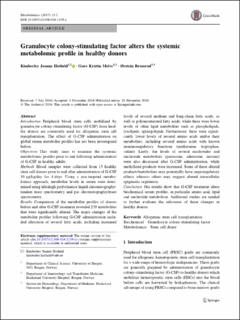Granulocyte colony-stimulating factor alters the systemic metabolomic profile in healthy donors
Journal article, Peer reviewed
Published version

Åpne
Permanent lenke
https://hdl.handle.net/11250/2727413Utgivelsesdato
2017Metadata
Vis full innførselSamlinger
- Department of Clinical Science [2289]
- Registrations from Cristin [9462]
Originalversjon
10.1007/s11306-016-1139-xSammendrag
Introduction:
Peripheral blood stem cells mobilized by granulocyte colony-stimulating factor (G-CSF) from healthy donors are commonly used for allogeneic stem cell transplantation. The effect of G-CSF administration on global serum metabolite profiles has not been investigated before.
Objectives:
This study aims to examine the systemic metabolomic profiles prior to and following administration of G-CSF in healthy adults.
Methods:
Blood samples were collected from 15 healthy stem cell donors prior to and after administration of G-CSF 10 µg/kg/day for 4 days. Using a non-targeted metabolomics approach, metabolite levels in serum were determined using ultrahigh performance liquid chromatography-tandem mass spectrometry and gas chromatography/mass spectrometry.
Results:
Comparison of the metabolite profiles of donors before and after G-CSF treatment revealed 239 metabolites that were significantly altered. The major changes of the metabolite profiles following G-CSF administration included alteration of several fatty acids, including increased levels of several medium and long-chain fatty acids, as well as polyunsaturated fatty acids; while there were lower levels of other lipid metabolites such as phospholipids, lysolipids, sphingolipids. Furthermore, there were significantly lower levels of several amino acids and/or their metabolites, including several amino acids with known immunoregulatory functions (methionine, tryptophan, valine). Lastly, the levels of several nucleotides and nucleotide metabolites (guanosine, adenosine, inosine) were also decreased after G-CSF administration, while methylated products were increased. Some of these altered products/metabolites may potentially have angioregulatory effects whereas others may suggest altered intracellular epigenetic regulation.
Conclusion:
Our results show that G-CSF treatment alters biochemical serum profiles, in particular amino acid, lipid and nucleotide metabolism. Additional studies are needed to further evaluate the relevance of these changes in healthy donors.
